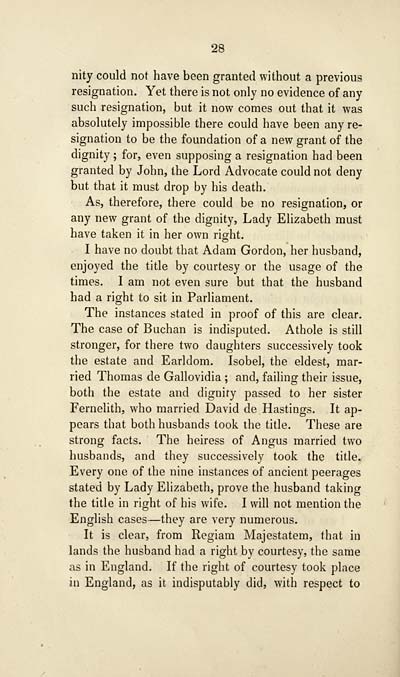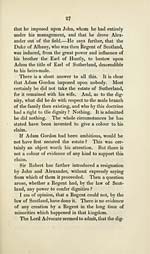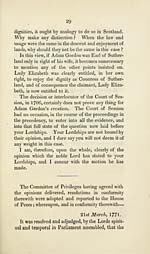Reports of claims preferred to the House of Lords in the cases of the Cassillis, Sutherland, Spynie, and Glencairn peerages
(118) Page 28
Download files
Complete book:
Individual page:
Thumbnail gallery: Grid view | List view

28
nity could not have been granted without a previous
resignation. Yet there is not only no evidence of any
such resignation, but it now comes out that it was
absolutely impossible there could have been any re-
signation to be the foundation of a new grant of the
dignity ; for, even supposing a resignation had been
granted by John, the Lord Advocate could not deny
but that it must drop by his death.
As, therefore, there could be no resignation, or
any new grant of the dignity, Lady Elizabeth must
have taken it in her own right.
I have no doubt that Adam Gordon, her husband,
enjoyed the title by courtesy or the usage of the
times. I am not even sure but that the husband
had a right to sit in Parliament.
The instances stated in proof of this are clear.
The case of Buchan is indisputed. Athole is still
stronger, for there two daughters successively took
the estate and Earldom. Isobel, the eldest, mar-
ried Thomas de Gallovidia ; and, failing their issue,
both the estate and dignity passed to her sister
Fernelith, who married David de Hastings. It ap-
pears that both husbands took the title. These are
strong facts. The heiress of Angus married two
husbands, and they successively took the title.
Every one of the nine instances of ancient peerages
stated by Lady Elizabeth, prove the husband taking
the title in right of his wife. I will not mention the
English cases — they are very numerous.
It is clear, from Regiam Majestatem, that in
lands the husband had a right by courtesy, the same
as in England. If the right of courtesy took place
in England, as it indisputably did, with respect to
nity could not have been granted without a previous
resignation. Yet there is not only no evidence of any
such resignation, but it now comes out that it was
absolutely impossible there could have been any re-
signation to be the foundation of a new grant of the
dignity ; for, even supposing a resignation had been
granted by John, the Lord Advocate could not deny
but that it must drop by his death.
As, therefore, there could be no resignation, or
any new grant of the dignity, Lady Elizabeth must
have taken it in her own right.
I have no doubt that Adam Gordon, her husband,
enjoyed the title by courtesy or the usage of the
times. I am not even sure but that the husband
had a right to sit in Parliament.
The instances stated in proof of this are clear.
The case of Buchan is indisputed. Athole is still
stronger, for there two daughters successively took
the estate and Earldom. Isobel, the eldest, mar-
ried Thomas de Gallovidia ; and, failing their issue,
both the estate and dignity passed to her sister
Fernelith, who married David de Hastings. It ap-
pears that both husbands took the title. These are
strong facts. The heiress of Angus married two
husbands, and they successively took the title.
Every one of the nine instances of ancient peerages
stated by Lady Elizabeth, prove the husband taking
the title in right of his wife. I will not mention the
English cases — they are very numerous.
It is clear, from Regiam Majestatem, that in
lands the husband had a right by courtesy, the same
as in England. If the right of courtesy took place
in England, as it indisputably did, with respect to
Set display mode to:
![]() Universal Viewer |
Universal Viewer | ![]() Mirador |
Large image | Transcription
Mirador |
Large image | Transcription
Images and transcriptions on this page, including medium image downloads, may be used under the Creative Commons Attribution 4.0 International Licence unless otherwise stated. ![]()
| Histories of Scottish families > Reports of claims preferred to the House of Lords in the cases of the Cassillis, Sutherland, Spynie, and Glencairn peerages > (118) Page 28 |
|---|
| Permanent URL | https://digital.nls.uk/95013318 |
|---|
| Description | A selection of almost 400 printed items relating to the history of Scottish families, mostly dating from the 19th and early 20th centuries. Includes memoirs, genealogies and clan histories, with a few produced by emigrant families. The earliest family history goes back to AD 916. |
|---|

